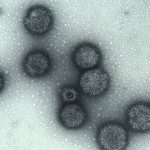Lien vers Pubmed [PMID] – 28666583
Transfus Clin Biol 2017 Sep;24(3):96-100
Flaviviruses are important human pathogens. Transmitted by the bite of infected mosquitoes, Flaviviruses such as West Nile and Japanese encephalitis may reach the central nervous system where they can elicit severe diseases. Their ability to cross the blood-brain-barrier is still poorly understood. The newly emerging Zika Flavivirus on the other hand very rarely reaches the brain of adults, but can infect neural progenitors in the developing central nervous system of fetuses, eliciting devastating congenital malformations including microcephaly. This short review focuses on selected aspects of West Nile, Japanese encephalitis and Zika virus pathophysiological features such as neuroinvasion and neurovirulence, and highlights what we know about some possible mechanisms involved in Flaviviral neuropathogenesis.


